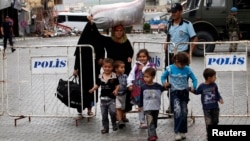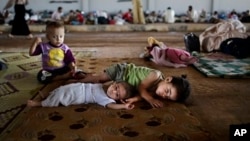BEIRUT —
An estimated 30,000 Syria refugees, most of them Kurds, have fled in the last three days to Kurdistan areas of Iraq or on the border waiting to be allowed access, according to United Nations aid officials.
The U.N. officials warned Monday that the exodus shows no signs of slowing down and that it is straining their resources as well as those of Iraqi relief agencies.
The exodus is one of the largest waves of refugees since the civil war broke out in Syria 29 months ago. Claire Bourgeois of the United Nations High Commissioner for Refugees (UNHCR) said the refugee surge was “unlike anything we have witnessed entering Iraq previously.”
“There is no way to confirm exact numbers because of the scale of the influx, but UNHCR teams at Sahela report that it looks like a river of people moving across the border,” Bourgeois said.
Some of the refugees have traveled from as far away as the city of Aleppo, 450 kilometers to the west, to cross a new pontoon bridge spanning the Tigris River into the Iraqi province of Dohuk. The pontoon bridge was opened last Thursday (August 15).
What sparked exodus unclear
The immediate reason for the sudden migration wasn’t clear to relief workers, but UNHCR’s Peter Kessler said about “95 percent are Kurds” and they appear to be fleeing worsening conditions in northern Syria. Kessler said their situation was being made worse by the fighting between rebels and forces loyal to Syrian President Bashar al-Assad as well as rebel “factions allied to more extremist elements.”
In recent weeks, clashes have increased between al-Qaida-affiliated jihadist rebels and Syrian Kurds aligned to Kurdish separatists in Turkey. The jihadists have sought to exert more control over enclaves they control in northern Syria, while Kurdish militants have tried to snatch oil fields currently controlled by the jihadists.
Kurdish militants captured the Syrian town Ras al-Ain on the border with Turkey last month, dealing a serious blow to the Al-Qaida affiliated Islamist rebels. In mid-2012, pro-Assad forces withdrew from Kurdish-majority areas in the north and since then Kurdish militants have been keen to keep other rebel groups out of their towns.
“This is an unprecedented influx of refugees, and the main concern is that so many of them are stuck out in the open at the border or in emergency reception areas with limited, if any, access to basic services,” said Alan Paul, of the British-based charity, Save the Children.
“The refugee response in Iraq is already thinly stretched, and close to half of the refugees are children who have experienced things no child should,” Paul said.
“There was war and looting and problems...We did not find a morsel [of food], so with our children, we came here,” refugee Abdulkarim Brendar, the father of five, told the French news agency AFP. Another refugee, Ahmed Karim, said he fled Syria to save his wife and three-week-old baby from dying of starvation. “There was a shortage of food in the market, and everything became expensive, from bread to gas canisters, and unemployment was spreading,” he said.
About 150,000 Syrian refugees are already registered in Iraq. Nearly two million Syrians have sought refuge in neighboring countries since the uprising against President Assad began in March 2011.
U.N. and Iraqi officials working together
U.N. officials say they are working with Iraq’s regional Kurdistan government to establish a camp at nearby Darashakran, but that it will take at least two weeks to build. Families and friends in towns near the border are taking in some refugees. Hundreds have been ferried to a refugee camp west of Irbil.
Until this weekend, Iraq had allowed in a relatively small number of refugees compared to Syria’s other neighbors. But the leader of the semi-autonomous Iraqi Kurdistan, Massoud Barzani, said recently that if Syria’s Kurds were “under threat of death and terrorism,” then he would be “prepared to defend them.” Iraqi Kurdistan consists of three provinces in northern Iraq and has its own military and police forces.
Kurdish officials in Iraq say they have allocated an additional $20 million for Syrian Kurdish refugees, but are seeking more financial aid from the United Nations and Iraq’s federal government.
Meanwhile, fighting in Syria intensified Monday on the Syrian coast where pro-government forces were reported to have pushed back a rebel offensive in the heartland of President Assad’s Alawite sect, an offshoot of Shia Islam. The rebel offensive was led by foreign jihadist fighters and was reported to have moved to within 19 kilometers of Qardaha - Assad's hometown and the burial site of his father Hafez al-Assad.
The Syrian Observatory for Human Rights, a British-based monitoring group that relies on a network of activists inside Syria, says pro-Assad forces have regained control of nine Alawite villages and are now fighting to recapture two villages still in rebel hands.
“Battles are ongoing and they are fierce,” said Abdel Rahman of the Syrian Observatory.
The U.N. officials warned Monday that the exodus shows no signs of slowing down and that it is straining their resources as well as those of Iraqi relief agencies.
The exodus is one of the largest waves of refugees since the civil war broke out in Syria 29 months ago. Claire Bourgeois of the United Nations High Commissioner for Refugees (UNHCR) said the refugee surge was “unlike anything we have witnessed entering Iraq previously.”
“There is no way to confirm exact numbers because of the scale of the influx, but UNHCR teams at Sahela report that it looks like a river of people moving across the border,” Bourgeois said.
Some of the refugees have traveled from as far away as the city of Aleppo, 450 kilometers to the west, to cross a new pontoon bridge spanning the Tigris River into the Iraqi province of Dohuk. The pontoon bridge was opened last Thursday (August 15).
What sparked exodus unclear
The immediate reason for the sudden migration wasn’t clear to relief workers, but UNHCR’s Peter Kessler said about “95 percent are Kurds” and they appear to be fleeing worsening conditions in northern Syria. Kessler said their situation was being made worse by the fighting between rebels and forces loyal to Syrian President Bashar al-Assad as well as rebel “factions allied to more extremist elements.”
In recent weeks, clashes have increased between al-Qaida-affiliated jihadist rebels and Syrian Kurds aligned to Kurdish separatists in Turkey. The jihadists have sought to exert more control over enclaves they control in northern Syria, while Kurdish militants have tried to snatch oil fields currently controlled by the jihadists.
Kurdish militants captured the Syrian town Ras al-Ain on the border with Turkey last month, dealing a serious blow to the Al-Qaida affiliated Islamist rebels. In mid-2012, pro-Assad forces withdrew from Kurdish-majority areas in the north and since then Kurdish militants have been keen to keep other rebel groups out of their towns.
“This is an unprecedented influx of refugees, and the main concern is that so many of them are stuck out in the open at the border or in emergency reception areas with limited, if any, access to basic services,” said Alan Paul, of the British-based charity, Save the Children.
“The refugee response in Iraq is already thinly stretched, and close to half of the refugees are children who have experienced things no child should,” Paul said.
“There was war and looting and problems...We did not find a morsel [of food], so with our children, we came here,” refugee Abdulkarim Brendar, the father of five, told the French news agency AFP. Another refugee, Ahmed Karim, said he fled Syria to save his wife and three-week-old baby from dying of starvation. “There was a shortage of food in the market, and everything became expensive, from bread to gas canisters, and unemployment was spreading,” he said.
About 150,000 Syrian refugees are already registered in Iraq. Nearly two million Syrians have sought refuge in neighboring countries since the uprising against President Assad began in March 2011.
U.N. and Iraqi officials working together
U.N. officials say they are working with Iraq’s regional Kurdistan government to establish a camp at nearby Darashakran, but that it will take at least two weeks to build. Families and friends in towns near the border are taking in some refugees. Hundreds have been ferried to a refugee camp west of Irbil.
Until this weekend, Iraq had allowed in a relatively small number of refugees compared to Syria’s other neighbors. But the leader of the semi-autonomous Iraqi Kurdistan, Massoud Barzani, said recently that if Syria’s Kurds were “under threat of death and terrorism,” then he would be “prepared to defend them.” Iraqi Kurdistan consists of three provinces in northern Iraq and has its own military and police forces.
Kurdish officials in Iraq say they have allocated an additional $20 million for Syrian Kurdish refugees, but are seeking more financial aid from the United Nations and Iraq’s federal government.
Meanwhile, fighting in Syria intensified Monday on the Syrian coast where pro-government forces were reported to have pushed back a rebel offensive in the heartland of President Assad’s Alawite sect, an offshoot of Shia Islam. The rebel offensive was led by foreign jihadist fighters and was reported to have moved to within 19 kilometers of Qardaha - Assad's hometown and the burial site of his father Hafez al-Assad.
The Syrian Observatory for Human Rights, a British-based monitoring group that relies on a network of activists inside Syria, says pro-Assad forces have regained control of nine Alawite villages and are now fighting to recapture two villages still in rebel hands.
“Battles are ongoing and they are fierce,” said Abdel Rahman of the Syrian Observatory.





